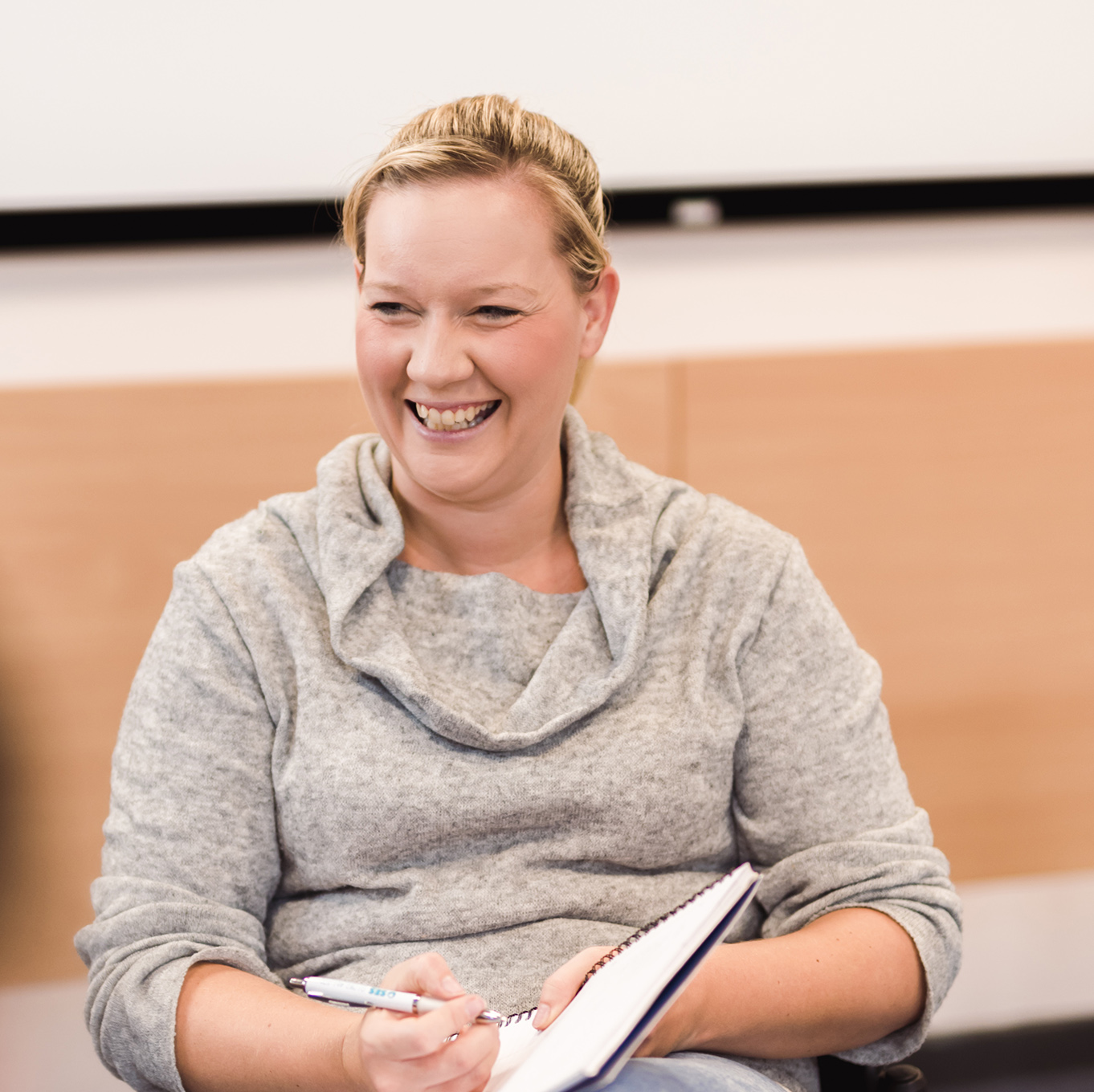Dip HE Counselling

Course details
Year of entry
2025
Duration
2 YRS (PT)
Institution Code
G53
Location
Wrexham
Course Highlights
Joint 1st
in Wales and top 10 in the UK for Graduate Prospects*
Focus on
employability
Taught by
qualified counsellors
Why choose this course?
As the demand for professional counsellors increases, particularly in the private sector, the Diploma in Counselling offers an opportunity to develop professionally and personally through an academic and experiential programme of study.
This course:
- Will provide you with a professional qualification in Counselling
- Will prepare you to work with adult clients
- Is taught by qualified counselors
- Will develop your ability to write and practice reflectively, apply theory in practice, understand and apply ethical principles in your work, and professionalism in practice
- Will help those working in related professions by adding valuable understanding and skills
*This course is part of a subject area ranked joint 1st in Wales and top 10 in the UK for Graduate Prospects in the Counselling, Psychotherapy and Occupational Therapy subject area league table in the Complete University Guide 2026.
*This course is rated 2nd in Wales in the Counselling, Psychotherapy, and Occupational Therapy subject area league table in the Daily Mail University League Table 2024.

Counselling atWrexham University
Thinking of a career in Counselling? Hear from lecturers and students about our course at Wrexham University.
Key course features
This course:
- Includes clinical placements - placements are an important part of the course and must be completed to qualify for the full diploma
- The course is grounded in the person-centred approach, allowing you to provide empathic, authentic relationships which will develop effective therapeutic interaction
- Emphasises the personal development, self-awareness and psychological maturity of the trainee
- Provides 450 face-to-face contact hours over 2 years.
What you will study
YEAR 1 (LEVEL 4)
Year one introduces the skills necessary to become an effective counsellor. Core theory modules cover the development of the person-centred approach to counselling, and the conditions required practically, personally, professionally and ethically to put these into practice.
The core skills or practice modules aim to enable you to develop effective counselling skills and put these into practice with peers. You will learn to analyse the levels of effectiveness of your own work and reflect on personal strengths and areas for development.
MODULES
- Person-Centred Counselling Skills (1): An introduction to counselling skills practice.
- Introducing Person Centred Counselling Theory: An introduction to counselling theory.
- Person-Centred Counselling Skills (2): A continuation from Skills (1). You will develop your skills practice with peers, extending your practice sessions and drawing on the theory learnt in the morning modules.
- Person-Centred Counselling Theory and Self-Development: You will develop your understanding of person-centred theory and how this relates to practice.
- Skills for Counselling Placement: This module begins to prepare you for your placement by developing your skills for placement interviews, to secure placements in advance of level 5.
- Contemporary Person-Centred Counselling Theory: Developing on person-centred counselling theory, looking at more recent developments in the field.
YEAR 2 (LEVEL 5)
Year 2 (level 5) builds on and expands your portfolio of skills and knowledge. In year 2 the clinical placement is undertaken, so you will be putting your skills into practice with clients in an agency setting. In year 2 as well as lectures and seminars/workshops you will also attend personal development / self-care groups to enhance your self-awareness.
MODULES
- Supervised Trainee Counselling Placement (1): This module is designed to support you in your placement. Group sessions are facilitated by module tutors, and you will be involved in discussions on placements issues, clients and ethical considerations. In this module, you are required to bring in recordings of your clients for your peers and module leaders to observe and offer constructive feedback.
- Understanding Client Issues in Counselling Practice: Developing on from Level 4 theory, this module is designed to give you more understanding around the presenting issues you may face with your clients and how this relates with person-centred theory.
- Evidencing Trainee Practice Effectiveness in Counselling: This module will support you in developing your final portfolio, evidencing your 100 client hours. You will attend weekly CPI and PD groups to support your counselling skills development.
- Supervised Trainee Counselling Practice (2): This module is designed to give you more understanding around the presenting issues you may face with your clients and how this relates with person-centred theory.
The information listed in this section is an overview of the academic content of the programme that will take the form of either core or option modules. Modules are designated as core or option in accordance with professional body requirements and internal academic framework review, so may be subject to change.
Entry requirements & applying
Normally qualifications at level 3 (BTEC, A-Level, Access courses, and Level 3 Counselling course completion) are an expectation. Wrexham University also offers a Level 4 Introduction to Counselling course which you may be interested in.
Applications are always enhanced by relevant experience of working in a helping role – whether paid or voluntary.
Sometimes applicants who do not meet the usual requirements for entry to a degree level programme may be considered. This is where they can demonstrate additional life/work-related experience and an ability to engage with the academic challenges of the programme.
A key requirement for joining the course is the emotional and psychological maturity to work with people in psychological distress and the resilience required to cope with the demands of this work.
In your application you should make clear your reasons for wanting to undertake the programme and what you believe the strengths you would bring to the role are.
Occupational health checks and DBS checks are conditions of a place on this course.
All applicants whose forms indicate that they may be suitable for the programme are invited to an information session, group activity and individual interview.
Teaching & Assessment
The course is taught face to face on campus, 1 day a week 9:00-4:30. The day is split with taught theory lectures in the morning, and skills practice in the afternoons. Classes are predominantly experiential meaning we teach from our own experience working with real clients. All teaching staff are active counsellors, with their own professional counselling background.
The course is assessed in a variety of ways. These assessments may be self, peer or tutor assessed, and include recordings and critiques of transcribed counselling sessions, live practice with peers (Triads), presentations, theory and reflection written assignments, case studies and portfolios of evidence. Clinical supervisor and placement reports all form important parts of the assessment process. There are no exams.
TEACHING AND LEARNING
We offer workshops and support sessions in areas such as academic writing, effective note-making and preparing for assignments.
Students can book appointments with academic skills tutors dedicated to helping deal with the practicalities of university work. Our student support section has more information on the help available.
In terms of particular needs, the University’s Inclusion Services can provide appropriate guidance and support should any students require reasonable adjustments to be made because of a recognised prevailing disability, medical condition, or specific learning difference.
Career prospects
Our dedicated Careers and Employability team is committed to helping you achieve your professional goals. They provide personalised advice, useful resources, and extracurricular employability events to prepare you for the job market.
Graduates of this course can pursue careers in:
- Counsellor
- Counselling supervisor
- School Counsellor
- Teaching
- Peer mentor
- Coaching
- Mental Health related roles
- Human Resources
- NHS
- Psychology related roles
Additionally, you may choose to further your expertise through postgraduate studies. Explore our postgraduate courses for more information.
Fees & funding
You do not have to pay your tuition fees upfront.
The fees you pay and the support available will depend on a number of different factors. Full information can be found on our fees & finance pages. You will also find information about what your fees include in the fee FAQs.
All fees are subject to any changes in government policy, view our undergraduate fees.
Programme specification
You can see the full programme specification here.Accommodation
At Wrexham University, we offer on-campus en-suite rooms within our Wrexham Student Village. These private, fully furnished spaces are conveniently located, providing easy access to campus facilities, study areas, and social spaces. Plus, you’re just a 10-minute walk from the city centre!
With all bills included, free Wi-Fi, 24/7 security, and large social areas, you’ll find everything you need for a great student experience.
Explore our student accommodation options to find your perfect home away from home.
Upcoming Open Days.
Join us at an upcoming open day to meet your lecturers, find out more about our courses, discover our facilities and get a taste of student life.
Browse all of our open days & events.

